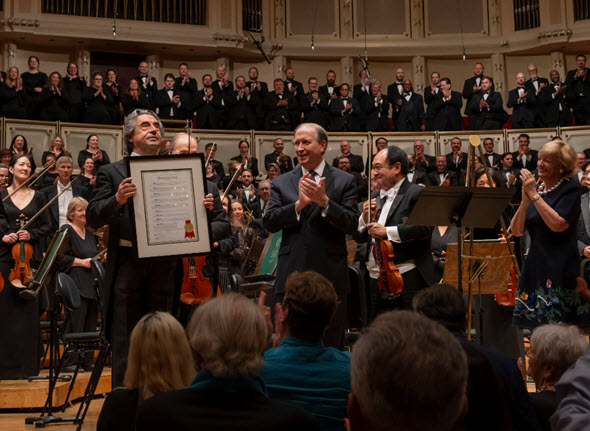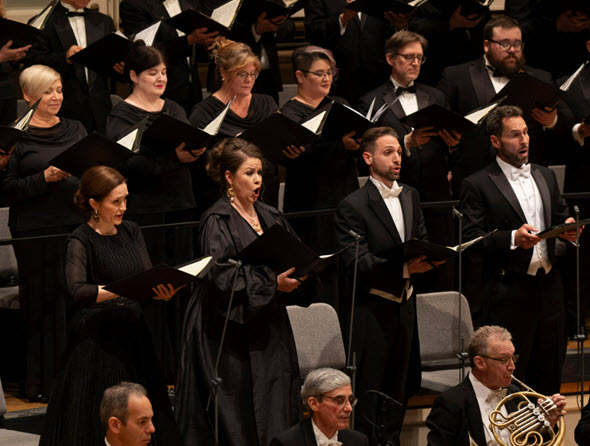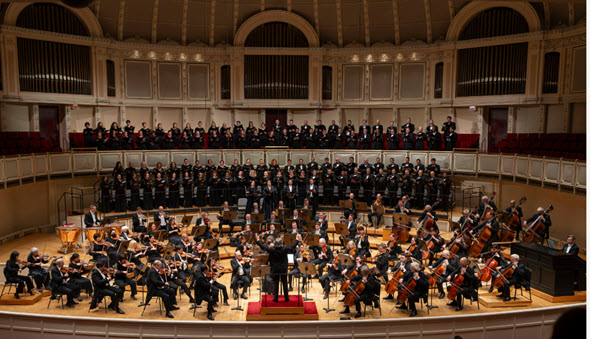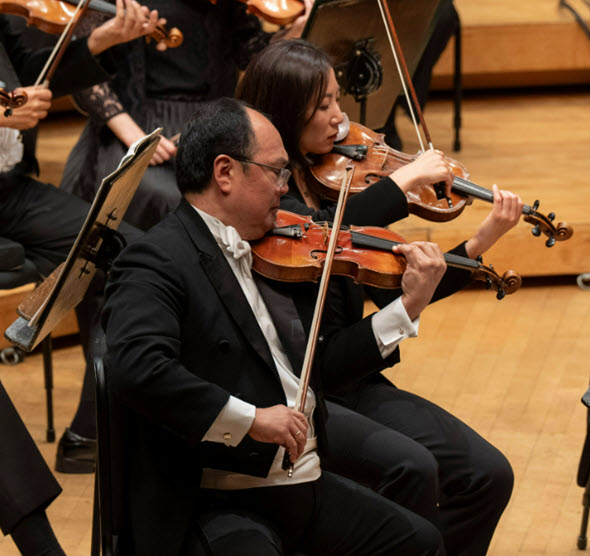Muti is CSO Music Director Emeritus for Life; honor caps grand Beethoven Missa Solemnis

Riccardo Muti displays the proclamation honoring him as Chicago Symphony Music Director Emeritus for Life. Looking on are, from center, CSO president Jeff Alexander, concertmaster Robert Chen and board chair Mary Louise Gorno. (Todd Rosenberg photos)
Review: Title conferred on Riccardo Muti as he concluded 13-year tenure as Chicago Symphony music director with the sublime Mass
By Lawrence B. Johnson
The Chicago Symphony Orchestra and its music director for the last 13 seasons have come to a conclusion and a consummation of that long and distinguished relationship, but not an ending. After a sublime account of Beethoven’s monumental Missa Solemnis with the CSO and Chorus at Orchestra Hall on June 23, Riccardo Muti was ceremoniously invested as Music Director Emeritus for Life in an onstage presentation by Jeff Alexander, president of the Chicago Symphony Orchestra Association and Mary Louise Gorno, chair of the association’s board of directors.
It was at once a sweeping proclamation of Muti’s artistic legacy and a testament to the deep bond that has developed between the Italian conductor, who will turn 82 in July, and the musicians of the Chicago Symphony, one of the most celebrated orchestras in the world. And on that resonant scale, the occasion was ideally matched with Muti’s swan song as music director — a luminous and penetrating performance of the Missa Solemnis, arguably Beethoven’s greatest achievement, composed in the same late years of his life as the Ninth Symphony and perhaps even transcending that revered masterpiece.
While the Missa Solemnis, or Solemn Mass, observes the formal structure and devotional intent of the Catholic mass, its dramatic bearing and, one might say, existential intensity, more forcibly establish it as the humanistic predecessor of other major “religious” concert works such as the Verdi Requiem and Brahms’ “German Requiem.” Across the 80-minute span of the Missa Solemnis, Beethoven summons mankind’s struggles and fears and spiritual aspirations with a profundity and musical rigor that also link him directly to Bach.
Indeed, counterpoint — both as an energizing force and a genesis of tumult — lies at the heart of Beethoven’s Mass. Time and again, the interweaving threads take the ultimate contrapuntal form of fugue, the rigorous layering of musical ideas into tapestries of thought, emotion and abstract sonority: the very essence of Bach. Such is the formidable construct of the Missa Solemnis, and thus its transformative experience for the listener. Muti’s traversal led ear and mind into the heart of a wondrous artwork.
Imagine the close interlacing, the often staggering contrapuntal eruptions, of Beethoven’s late string quartets translated onto a vast scale, and you have the structural gist and expressive concentration of the Missa Solemnis. So it was with Muti’s unfolding of the work, splendor upon spiritual splendor: Just as the first declamatory chords of the “Kyrie” established the precision and integration of orchestra and chorus, the fugal episodes of the “Gloria” generated a cosmic upheaval of pyrotechnical brilliance — an affirmation of spirit enmeshed in a display of immense intellectual potency.

Aligned in front of the chorus were soloists, from left, soprano Erin Morley, mezzo-soprano Alisa Kolosova, tenor Giovanni Sala and bass-baritone Kyle Ketelsen.
It is in the “Gloria” that Beethoven transfigures the Mass from the narrows of specific religious faith to the greater embrace of the human condition, by shifting the expressive context from church service to the quotidian stage. The Chicago Symphony Chorus became the voice of everyman, the player who acts and strives and labors and suffers. The urgency and power the chorus brought to the crowning fugue, “In gloria Dei patris,” bespoke both Muti’s seamless integration of the vocal and orchestral strands and the preparatory hand of guest choral director Donald Palumbo, who holds that post with the Metropolitan Opera.
All that said, one might argue that the musical and dramatic core of the Missa Solemnis is the towering “Credo,” running some 20 minutes and spreading the musical wealth from strings to woodwinds and brass, from chorus to soloists. That last contingent was yet another great strength of this production: soprano Erin Morley, mezzo-soprano Alisa Kolosova, tenor Giovanni Sala and bass-baritone Kyle Ketelsen. These four finely matched voices underscored the conviction of Beethoven’s music as a common cry of the human heart in the daunting vastness of life.
The “Sanctus” introduces a fifth solo voice, a single violin whose gentle singing seems to buoy the entire movement. CSO concertmaster Robert Chen offered radiant playing through this expansive and gentle episode, as indeed the full orchestra did in the ensuring prelude that leads into the “Benedictus.” The closing “Agnus Dei” again found Muti, the master of opera, observing wise and heightening restraint as this drama wound down to its last chorused appeal of “Dona nobis pacem.”
While it rounded out Muti’s directorship, this magnificent Missa Solemnis was by no means Muti’s last hurrah at Orchestra Hall. He was not named Music Director Emeritus for nothing. He will be on the podium in September to open the Chicago Symphony’s 2023-24 season, then lead the orchestra in concerts on consecutive nights at Carnegie Hall in October to open that season. In January 2024 Muti will take the CSO on a three-week European tour. He has a further six-week engagement with the orchestra in 2024-25, most or all of which he will spend at Orchestra Hall.
By then, Muti will be nearly 84 years old, whatever that means. He’s still capable of leaping off the podium in an expressive transport. And, of course, the irrepressible maestro is now the Chicago Symphony Orchestra’s Music Director Emeritus…for Life.



